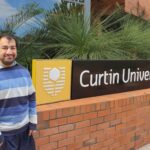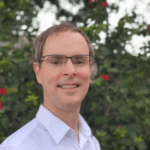First and foremost I would like to congratulate all of this evening’s graduates – yours is a great achievement and one that will benefit and influence the course of your lives as you now embark on the next stage of that great journey.
I am also grateful to Curtin University for having afforded me the opportunity to address you this evening. At the same time I found myself presented with something of a dilemma. The many engineers here, most of whom I have taught at some point in their studies, will of course be expecting me to use this final opportunity to lecture them on Fluid Mechanics… and this is a tempting option – how magnificent the Navier-Stokes equations would look showcased on the big screens! However, to do so would be unfair to the economists here… and so the engineers owe a debt of gratitude to the economists: for sparing all of us the obscure intricacies of momentum equations, control volumes and the like.
As a result I have chosen to travel something of neutral path for this evening’s address… at least in terms of discipline area. Thus, rather than talk about “the what, the which and the why,” the theme of what follows is “the how,” most particularly in relation to coping with the new stage in life that now stretches out ahead of you.
To do so I will start by reading you a poem, in fact a sonnet (so it’s short!), written around about 1817, by Percy Shelley (who you may be interested to know was “terminated” by Oxford University, but not for failing his units!)
Ozymandias
by Percy Bysshe Shelley
I met a traveller from an antique land
Who said: “Two vast and trunkless legs of stone
Stand in the desert. Near them on the sand,
Half sunk, a shattered visage lies, whose frown
And wrinkled lip and sneer of cold command
Tell that its sculptor well those passions read
Which yet survive, stamped on these lifeless things,
The hand that mocked them and the heart that fed.
And on the pedestal these words appear:
My name is Ozymandias, King of Kings:
Look on my works, ye mighty, and despair!’
Nothing beside remains. Round the decay
Of that colossal wreck, boundless and bare,
The lone and level sands stretch far away.
Poetry comprises and combines many aspects in terms of description, echoes, resonances, ways-of-seeing and messages. The foregoing is no exception. However, I will take up only two such elements of Ozymandias.
The most striking feature of this poem is the description of Ozymandias, thought to modelled upon Rameses II, one of the most powerful pharaohs of the ancient Egyptian empire. That aside, the poem succinctly conveys the arrogance and heartlessness of power, and in this extreme, absolute power. And then… it shows how both History and Nature record and demolish the life and reputation of one engorged upon and then consumed by power. Herein, lies a message for us. Do not seek power for its own sake nor be driven to advance oneself over all others as did Ozymandias – My name is Ozymandias, King of Kings: Look on my works, ye mighty, and despair! These turn out to be hollow words. Power consumes and is self-consuming. It is wholly different from the leadership that many of you will undertake in your careers. Yes, power does accompany leadership but equally so leadership is accompanied by the responsibility and care for those who one is leading.
The second, perhaps more subtle, “message” from the poem is that a powerful and all-dominant civilization can be reduced to nothing more that a physical and cultural desert – Nothing beside remains; Round the decay of that colossal wreck, boundless and bare; The lone and level sands stretch far away. This is perhaps, the imagining of hot-headed poet of long ago, but then History shows us many cases of the decline, fall and ultimate obliteration of civilizations. And now, our present, global civilization, appears to be under its own type of threat through seemingly inexorable changes such as global warming, the results of which could perhaps both metaphorically and physically reduce our environment to one in which The lone and level sands stretch far away. The contemporary message here, then, is that if we do not nurture, adapt and evolve the culture and practices of our own civilization, then we too could end up as the subject matter of a melancholy sonnet.
Global warming is just one of a number of big issues with which the younger generation is oft, and sometimes depressingly, bombarded. And perhaps unfairly, in that societal and environmental problems always seem to have been inherited from the previous generation. But this has always been the case and now the mantle of responsibility is passed onto you as guardians, creators, shapers, solvers, and as the vigorous heart of Society and our Civilization. The question that each of you may now be facing is ‘How can I, as one person among millions, nay billions, have any effect in the shaping and the movement of a global society?’ To confront this question is truly daunting because it hints at the smallness, purpose and worth of our finite lives. The last five, so-called philosophical, chapters of Leo Tolstoy’s novel “War and Peace” are dedicated to this question under the sub-title “What moves nations?”. (Since Tolstoy’s time, we have moved on, from national to global matters and inter-relations.)
At first sight it seems that the only way to meet the challenge is to become famous, wealthy or politically powerful and then use the opportunities so-offered to “really change things”. This is a valid course of action provided that the journey to such a state does not result in what we could call Ozymandias-syndrome. However, fame, wealth and power, by their very nature, can only be attained by a tiny minority. What then about the rest of us?
‘How can I, as one person, have any effect in the shaping and the movement of a global society?’ The answer that applies to all of us perhaps lies in the question itself. The “I” – each individual in the question – is an essential part of what, when summed, is that nation or global society. Mother Theresa famously noted that our lives are ‘just a drop in the ocean’ and then continued with… ‘but the ocean is made up of many drops’. Yes, we live in and draw from a Society for our individual needs… but, at the same time, we are that Society and therefore contribute to its character and its development through what each individual is and what he or she does. Moreover, we have a shared responsibility to ensure its well-being and future sustainability. How we achieve the solutions to societal and global problems may require us to re-calibrate the balance of emphasis between the individual and the community. What is certain, is that we all need to make our contributions to the community and at the level at which we are best able. ‘Ask not what your country can do for you, but what you can do for your country’ as John F. Kennedy put it within a national context. All such contributions are important and from doing so each individual can take pride in having played their part in shaping an increasingly shared future. This is what holds a community together and charts its path – be it that of a family, town, nation or our interconnected world.
“To give is greater than to receive” is an assertion oft-repeated by the older generation. This may seem to be a pious platitude or, at worst, a command by those most savvy to those most gullible! But cliches are mostly founded in truth. Think about your families, friends and supporters here tonight. Think about your lecturers here on the stage. They have given and in doing so contributed to the fulfillment of your ambitions… and at the same time prepared you to take your place and ultimately lead in a community of which we are all a part. Likewise, throughout your working lives I exhort you to consider and give to the community in whatever you do, keeping in mind the inextricable link – the symbiosis – between the “I” and the “we” – the individual and the community. At life’s end it is upon what we have given that we reflect – what we have received or attained amounts to little because, to use another cliche, “you can’t take it with you”.
What you give becomes your legacy… and that encompasses your influence on others, your having made a difference, and your having created a better place for your offspring and the next generation than that bequeathed by Ozymandias!
That concludes my lecture. Happily on this occasion, there is no associated assessment! Examinations, mid-semester tests, assignments and the like are now behind you. What lies ahead is perhaps a test in how you conduct your lives and careers. However, I have every confidence that your performance in life’s test will do you and your families proud, and be a credit to Curtin. I wish you the very best for your futures. Thank you for listening.


